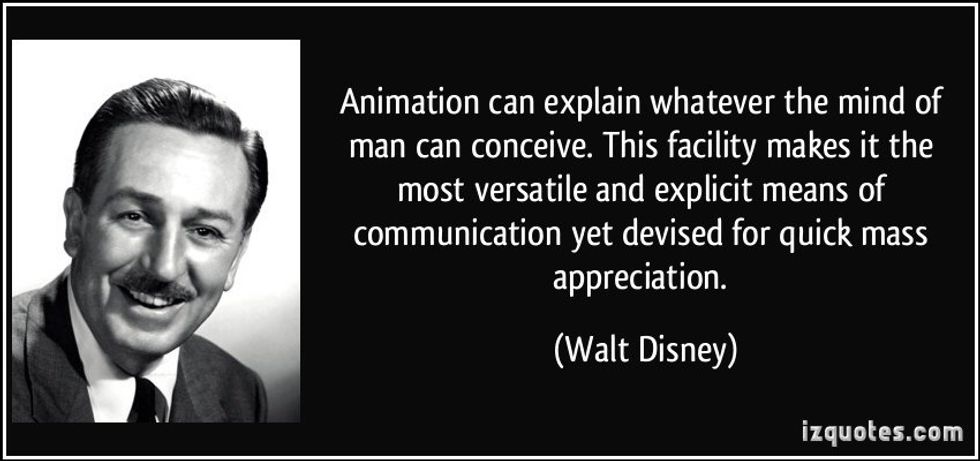I am not ashamed to talk or write about animation because contrary to other film critics, I am a firm believer in the emotional and intellectual power animation possesses.
Most people do not consider animated movies to be something other than an entertainment outlet for young children. These are the same people, usually older adults, that are unwilling to take animated movies seriously. But ask yourself this: what is the problem, if any, in learning from an animated movie? The simple and obvious answer is that there isn't an issue. We should not be afraid to learn from something that we simply "deem" childish; after all, there are many, many, live-action films where one would never know if the film was created by adults or not.
Yet I can understand the counter-argument as well. Unfortunately, the reality is that not all animation is noteworthy, deserving of the same level of analysis and inspection given to great live-action films. This does not mean, however, that all animation can be written off. It is proper and more intellectually sound to say that both live-action and animation have an equal opportunity to make a strong impact on audiences, to pioneer new ways of thinking, and to present interesting, fresh perspectives of the world we live in. And the truth of the matter is that both art forms often take advantage of this opportunity.
So why don't both sides receive equal treatment when they should? Part of the problem is that we have strayed away from the mentality glorified, treasured, and valued by Walt Disney: the mentality of a child. As we grow older, we hear excessively from our world that it is more valuable to think as an adult than it is to think as a child. This is true in many circumstances, after all, you would not want to be thinking as a five year old when doing your taxes. The flip-side of this is that when we distance ourselves from our "inner-child," we lose a valuable part of ourselves, the part of us that loves life for what it is, the part of us that breathes existence into our dreams and wishes, and the part of us that motivates us to be our own unique selves.
To demonstrate what I am saying, I am going to list a series of popular animated movies. When you read the various titles, ask yourself: What is the very first thing I think of when I picture this movie?
1. "Up"
2. "Frozen"
3. "Winnie the Pooh"
4. "Inside Out"
5. "Zootopia"
If you are like most adults, your thoughts probably look like the following:
1. "Up": A house with lots of balloons.
2. "Frozen": That super annoying, yet catchy song "Let it Go."
3. "Winnie the Pooh": Honey?
4. "Inside Out": That movie that teaches kids we are controlled by little cartoon characters in our minds.
5. "Zootopia": Anthropomorphic animals living in a utopia.
Do you notice what is missing from the above responses? The vitality, the imagination, and the will to dream! Simply, the responses sound similar to the mechanical, automatic conclusions that are acceptable and promoted in our world. Also, notice how none of the responses demonstrate the will to give the movies a chance to prove they are something besides entertainment for small children.
For comparison purposes, I asked a younger member of my community what came to his mind when he pictured the above movies.
1. "Up": A movie focusing mainly on the value of family and love, with an awesome adventure, talking dogs, and lots of funny moments.
2. "Frozen": The story of someone who feels they don't belong anywhere.
3. "Winnie the Pooh": A fun-filled and hilarious adventure.
4. "Inside Out": Something that made me realize just how unique we all are.
5. "Zootopia": A story of what true friendship and acceptance is, and why I should never give up on pursuing my dreams.
If you compare both sets of answers side-by-side, the difference is extraordinary. Instead of stale responses, my friend's answers come from a mind that is willing to live without fear. To appreciate that wisdom often comes from places and things we would not expect, and most importantly, a mind that carries a deeper understanding of friendship than most adults because he is willing to accept, not push away.
For those of you who are still skeptical of the power, importance, and relevance of animation, all you need to understand then is that animation is a medium for transmitting ideas and perspectives; at its most basic level, animation is just another way to view our world. Walt Disney put it best when he said,
So the next time you find yourself watching an animated film or show, give it a chance by allowing yourself to be caught up in the excitement and visual wonder before you. After all, you may just find yourself remembering when you were a child, sitting on the edge of your seat, in awe of the characters and story before you and when you do that, your inner child will thank you for allowing him or her to peer out from behind your eyes and live once again.



















